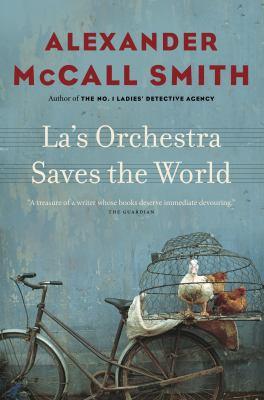
La's orchestra saves the world
In World War II Suffolk recently widowed La forms an amateur orchestra to entertain the locals and soothe her own broken heart. She soon develops a touching friendship with the Polish refugee she's recruited to play the flute. But when the war ends and the orchestra disbands she must ponder her next move.
Browse Related Items
| Subject |
| World War, 1939-1945 > England > Fiction. Orchestra > Fiction. Man-woman relationships > Fiction. Friendship > Fiction. Suffolk (England) > Fiction. |
| Genre |
| Fiction. |
- ISBN: 0307398110
- ISBN: 9780307398116
-
Physical Description
print
250 pages - Edition 1st ed.
- Publisher Toronto : Alfred A. Knopf, 2009.
Content descriptions
| Immediate Source of Acquisition Note: | LSC 29.95 |
Additional Information

La's Orchestra Saves the World
Click an element below to view details:
Excerpt
La's Orchestra Saves the World
One Two men, who were brothers, went to Suffolk. One drove the car, an old Bristol drophead coupé in British racing green, while the other navigated, using an out-of-date linen-backed map. That the map was an old one did not matter too much: the roads they were following had been there for a long time and were clearly marked on their map -- narrow lanes flanked by hedgerows following no logic other than ancient farm boundaries. The road-signs -- promising short distances of four miles, two miles, even half a mile -- were made of heavy cast-iron, forged to last for generations of travellers. Some conscientious hand had kept them freshly painted, their black lettering sharp and clear against chalk-white backgrounds, pointing to villages with names that meant something a long time ago but which were now detached from the things to which they referred -- the names of long-forgotten yeoman families, of mounds, of the crops they grew, of the wild flora of those parts. Garlic, cress, nettles, crosswort -- all these featured in the place-names of the farms and villages that dotted the countryside -- their comfortable names reminders of a gentle country that once existed in these parts, England. It still survived, of course, tenacious here and there, revealed in a glimpse of a languorous cricket match on a green, of a trout pool under willow branches, of a man in a flat cap digging up potatoes; a country that still existed but was being driven into redoubts such as this. The heart might ache for that England, thought one of the brothers; might ache for what we have lost. They almost missed the turning to the village, so quickly did it come upon them. There were oak trees at the edge of a field and immediately beyond these, meandering off to the left, was the road leading to the place they wanted. The man with the map shouted out, 'Whoa! Slow down,' and the driver reacted quickly, stamping on the brakes of the Bristol, bringing it to a halt with a faint smell of scorched rubber. They looked at the sign, which was a low one, almost obscured by the topmost leaves of nettles and clumps of cow parsley. It was the place. It was a narrow road, barely wide enough for two vehicles. Here and there informal passing places had been established by local use -- places where wheels had flattened the grass and pushed the hedgerows back a few inches. But you only needed these if there were other road-users, and there were none that Saturday afternoon. People were sleeping, or tending their gardens in the drowsy heat of summer, or perhaps just thinking. 'It's very quiet, isn't it?' remarked the driver when they stopped to check their bearings at the road end. 'That's what I like about it,' said the other man. 'This quietness. Do you remember that?' 'We would never have noticed it. We would have been too young.' They drove on slowly to the edge of the village. The tower of a Norman church rose above a stand of alders. In some inexplicable mood of Victorian architectural enthusiasm, a small stone bobble, rather like a large cannonball, had been added at each corner of the tower. These additions were too small to ruin the original proportions, too large to be ignored; Suffolk churches were used to such spoliation, although in the past it had been carried out in a harsh mood of Puritan iconoclasm rather than prettification. There was to be no idolatry here: Marian and other suspect imagery had been rooted out, gouged from the wood of pew-ends and reredoses, chipped from stone baptismal fonts; stained glass survived, as it did here, only because it would be too costly to replace with the clear glass of Puritanism. Behind the church, the main street, a winding affair, was lined mostly by houses, joined to one another in the cheek-by-jowl democracy of a variegated terrace. Some of t Excerpted from La's Orchestra Saves the World by Alexander McCall Smith All rights reserved by the original copyright owners. Excerpts are provided for display purposes only and may not be reproduced, reprinted or distributed without the written permission of the publisher.


